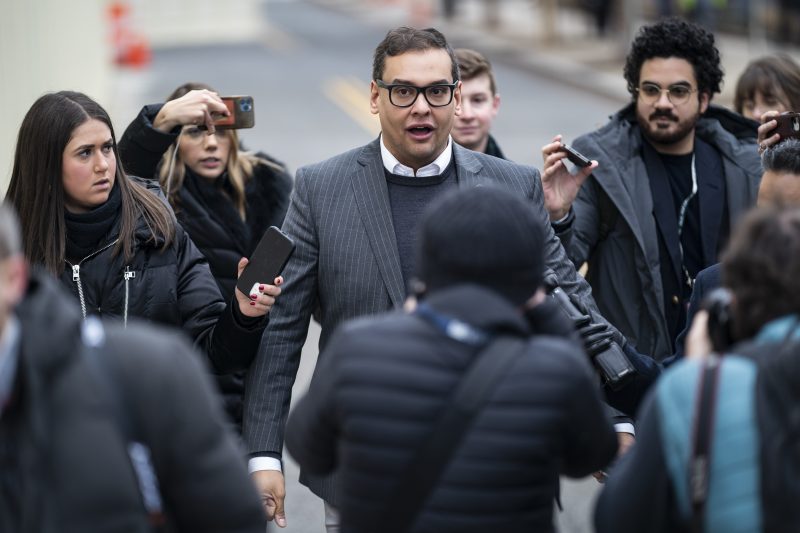Hiring season is winding down on Capitol Hill. The flurry of forwarded résumés is fading, staff positions in House and Senate offices are nearly filled, and the mostly serious business of governing is taking hold.
The biennial job carousel, a parlor game that plays out in the Capitol’s bustling hallways, hyperdrive text chains and chatty cafeteria lines, is always a closely watched exercise by staffers. Who’s up, who’s down? Who’s in, who’s out?
But perhaps no staff hirings this year are being more closely watched than those of Rep. George Santos, the New York Republican who since his election in November has been buried in an avalanche of revelations that point to him not being the person he once claimed to be. He did not, for instance, graduate from Baruch College (or play volleyball for its team). Nor did he work for Goldman Sachs or Citigroup. And his grandparents did not flee Jewish persecution in Ukraine.
There are also questions about where his money came from, how he funded his campaign, and his work for a Florida company that the Securities and Exchange Commission is suing and has alleged is a “classic Ponzi scheme.”
Even as he has had to answer — or not answer — those myriad questions, Santos has been assembling a staff for his Washington and district offices, the No. 1 priority for first-term representatives. That means interviewing job candidates, vetting résumés, running background checks and finding people willing to work for a member who appears allergic to truth-telling.
Taking a job for Santos could prove dicey for staffers. In conversations with more than a dozen former and current Republican and Democratic lawmakers and staff members, many wondered if those who go to work for Santos, particularly higher-level staffers, would ever be able to find another congressional office that would hire them.
So far, there is public information available for just five positions that Santos has filled, including chief of staff and communications director, according to LegiStorm, which tracks and posts congressional hiring. The initial makeup of Santos’s staff seems to lack the deep Capitol Hill experience that new members typically seek to help them get off to an effective start and quickly adjust to the rhythms and demands of Congress.
Santos hired Charles Lovett as his chief of staff. Lovett served as Santos’s campaign manager and worked for six months as a field organizer for the Ohio Republican Party, according to LegiStorm. He also served as political director for Ohio Republican Josh Mandel’s unsuccessful primary bid for Senate. He has not worked on the Hill previously. Viswanag Burra, Santos’s operations director, spent less than a year as special operations director for Rep. Matt Gaetz (R-Fla.) and recently worked as executive secretary for the New York Young Republican Club.
His communications director, Naysa Woomer, appears to have the most Hill experience. She worked for three Republican members between 2014 and 2018 before moving to Massachusetts to be the communications director for the state Republican Party and then as a communications specialist for the state Department of Revenue.
Rafaello Carone, Santos’s senior legislative assistant, worked for three GOP members, but his stints were short in each office. He spent six months as social media manager for Rep. Madison Cawthorn (R-N.C.), two months as deputy communications director for Rep. Greg Steube (R-Fla.) and a month as press secretary for Rep. Paul A. Gosar (R-Ariz.), according to LegiStorm. He also ran a consulting firm that mostly worked for long-shot Republican congressional candidates. Gabrielle Lipsky, who served as Santos’s campaign press secretary, will be his press secretary and office manager. She does not have Hill experience.
A Santos staff member familiar with the hiring process said that the LegiStorm site is not up to date and that the congressman’s D.C. and New York offices are “fully staffed.” Each member of Congress is provided with 18 full-time staff positions to spread across their offices as they see fit.
Woomer, Santos’s communications director, said Thursday that the congressman would not be available for an interview for this story. His staff, she said, “all took this on because we have interest in serving the constituents of the 3rd Congressional District.” Santos’s staff members did not respond to emails seeking comment.
Fully staffed or not, Santos’s offices are already having to respond to the onslaught of requests from constituents and others that typically fill the inboxes of Congress members.
Jimmy Keady, a Virginia-based GOP strategist whose career as a Hill staffer included stints in senior staff for congressional freshmen, said it’s “imperative” that a freshman member of Congress surround themselves with Hill veterans who know what they’re doing — otherwise, they may find themselves underwater pretty fast.
“Capitol Hill is not a place where you can just, you know, walk in and understand what to do,” Keady said. “There are a lot of rules, there’s a lot of regulations, and there’s a lot of pitfalls that a lot of these freshmen members make because they don’t have staff around them who are experienced.”
If a new member isn’t focused on constituent services right away, Keady said, the voters are going to feel it.
“If you have members deciding, ‘I’m going to gut my constituents services, and I’m not going to have a [legislative director] — I’m just going to have six people on comms staff,’ you know, that’s fine — that might get you on Fox News,” Keady said. “But that constituent that has been waiting for their veteran benefits for six months, they’re not going to get service, because that is also a job of a member of Congress.”
At the top of the to-do list for a new member is leasing a district office or offices — and outfitting them with everything, including internet, phones, desks, chairs and paper clips. And from Day One, they need to start responding to the unceasing inquiries from constituents needing help with Social Security checks, veterans’ issues and passports. And that’s all while the new member gets acquainted with the politics of Washington and the rules, official and otherwise, of Congress.
Jeff Jackson, a freshman Democrat from North Carolina, has been documenting his first weeks in Congress on Instagram with posts on how new representatives choose their office space and explainers about financial disclosures. He said hiring people with experience on the Hill and in his district was a priority.
“Having people come in who are well-versed in how to do this gives me a lot of comfort,” Jackson said in an interview. “I’ve only been here a few weeks, but what I’ve learned is that there is a tidal wave of work hitting our office every day and it takes a whole team to stay afloat. If you’re just one man on a surfboard, you’re going to get crushed.”
It’s hard enough to get offices up and running in normal circumstances, but Santos is under intense media scrutiny. And he’s facing calls to give up his seat not just from Democrats, but from Republicans as well, including six GOP representatives from New York.
This month, Rep. Anthony D’Esposito, a Republican freshman whose district borders Santos’s, said Santos told “outright lies” and called on him to resign. And Nassau County Republican Committee Chairman Joseph G. Cairo Jr. said Santos no longer had the support of Republicans in the 3rd Congressional District. “George Santos’s campaign last year was a campaign of deceit, lies and fabrication,” Cairo said during a Jan. 11 news conference. “He’s disgraced the House of Representatives, and we do not consider him one of our congresspeople.”
Santos has said he will not resign his seat. House Speaker Kevin McCarthy (R-Calif.), who needs Santos’s vote as he clings to a narrow majority in the House, has also rejected calls for Santos to resign and said this month that Santos was legally elected and seated without objection. House Republicans have assigned Santos to the House Small Business and the Science, Space and Technology committees.
Freshman Rep. Chuck Edwards (R-N.C.) is all too familiar with what can happen if members allow constituent services to be neglected: He is cleaning up the mess left behind by his predecessor, Cawthorn.
Cawthorn, who took office in 2021 at age 25 and exited in scandal, prioritized publicity as a lawmaker. “I have built my staff around comms rather than legislation,” he wrote in an email to Republican colleagues published by Time magazine in 2021.
After losing in a GOP primary to Edwards, Cawthorn largely neglected some of his duties as a congressman. By October, calls to his district office were met by a voice mail noting that he was winding down the office and not accepting any new casework — even though outgoing members of Congress typically keep the office open and transfer all the files to the incoming member so that there is no interruption of service to residents in their district.
Instead, Edwards said Cawthorn did not leave him anything — “no files, no data, no anything.”
“We had to start from scratch,” he said.
He tried to get a head start while serving out the remainder of his term in the North Carolina Senate, encouraging constituents who had met with silence from Cawthorn to contact his state office. He recently heard from students who thought Cawthorn was going to nominate them to military academies and were getting anxious as the deadline approached.
In the state Senate, he said, “our office mantra was first in constituent services. We’ve already made that the office mantra of this congressional office.”
For staffers who have opted to work for Santos, a future on Capitol Hill could prove difficult to negotiate, said George McElwee, who served as chief of staff for former GOP congressman Charlie Dent from Pennsylvania and was also president of the House Chiefs of Staff Association.
“Particularly for staff in those senior roles, people are going to wonder why they’re there. Why are they continuing on?” said McElwee, who is a lobbyist at a bipartisan firm he co-founded in Washington. “And it’s probably going to hurt them at some point in their job prospects.”
McElwee doesn’t expect Santos to be able to hang on to staffers who hope to have careers on the Hill.
“A lot of the folks in his office probably have an eye to the door and they’re trying to find the route to get out,” he said. “They know it’s not a stable environment for them in their political future.”








